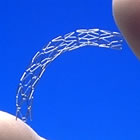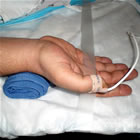
|
Contrast Dye
|
|
||||||||||||
Current Postings on This Page (14):
• I had a heart catherazation [catheterization] done using contrast which nearly killed me. I told the doctor that I had a family history of allergic reactions. I have blockages (2) in my chest and my doctor says there's no other dye he can use instead of the contrast. The kidney doctor had to give me a drip to flush my kidneys. It took 3 days before I regrouped physically. I had blurry vision,nauseous,dizzy with a serious upset stomach. The itching nearly drove me crazy. I had to take a benadryl and a pepcid to help me feel better. I am terrified to let them use it again,but I must get these blocks fixed. Please let me know if there's another dye that can be used. I have to see my cardiologist on the 17th. of this month. Please answer me as soon as you can. I am truly in a bad way,but very concerned for my health. The kidney doctor advises me against the contrast. Thanks,Ms.C.F.Bucks (Houston,Texas)P.s. I am also diabetic,and high blood pressure
• I will soon have angiogram/angioplasty for PAD in both legs. I have only one kidney functioning at 87%. I am concerned about the dye used in these procedures, possibly damaging my kidney. Should I worry??
• Question: 2004 dye was put into my arteries via both armpits; had constant pain for over 3 yrs. followed; immediately, right thumb and forefinger began cracking, bleeding, swelling and has continued to this date/12/29/12. Have to keep bandaids on fingers to do anything. No skin problems before. What is the cause? Had several arteriograms before via groin areas. No complications there. Doctors and dermatologists unable to heal....
• Does anyone know of an angioplasty/stenting procedure that can be done without contrasting dye? my father was a kidney donor and now it appears that he'll need an angioplasty procedure and we're exploring all options to reduce the likelihood of kidney damage to his remaining kidney. thank you so much for your responses and ideas... • My 70 Year old father underwent PTCA at a hospital
in India. He had 2 blocks. One was found during the angiogram before the
PTCA. He was an insulin dependent diabetic for 25 years. Post surgery he
had lot of blood loss in the groin area and also went into kidney failure
and was put on dialysis for for 3-4 days, apparently due to CIN (contrast
induced nephropathy) According to the doctor he also suffered Respiratory
acidosis meaning acute respiratory failure and was on ventilator for nearly
6 days. Since he could not eat thru the mouth, he was being fed via a nasal
tube. His kidneys became normal eventually. On the 9th day after the surgery,
they attempted to wean him off the ventilator. During the time, I suspect
some procedures weren't performed by an experienced doctor. He died on
the 9th day and the cause of his death is stated as respiratory failure,
and cardiac arrest. Anyone experienced similar situations in their treatment
of loved ones in hospital care?
• Can use of the contrast dye cause immediate renal
failure? My mother had an angioplasty done approx 2003, with a a coronary
stent placed. After approx
4 weeks the stent didn't take, (tissue built up) and the procedure was repeated
on this time she ended up with total renal failure--what went wrong, the heart,
the kidney or the dye? please help!!! • Since having
PCI about a year ago, I also have had a few symptoms of Hypothyroidism, including
Bradycardia. I have wondered
whether this may have been caused by the contrast dye used during the procedure.
Your (Forum Editor) response to the previous post would seem to indicate
otherwise. Since reading this post some time ago however, I have read of
other persons having similar experiences. Recently I came across this excellent
article on Hypothyroidism at http://www.emedicine.com/med/TOPIC1145.HTM
I quote from the CAUSES section: "Iodine deficiency or excess: Worldwide
Iodine deficiency is the most common cause of hypothyroidism. Excess iodine,
as in radiocontrast dyes, amiodarone, health tonics, and seaweed, inhibits
iodide organification and thyroid hormone synthesis. Most healthy individuals
have a physiologic escape from this effect; however those with abnormal
thyroid glands may not. These include patients with autoimmune thyroiditis,
surgically treated Graves hyperthyroidism (subtotal thyroidectomy) and
prior radioiodine therapy." So maybe there is something in it
after all? Cheers.
• Can the level of iodine in the contrast dye used
in an angiogram be enough to cause damage to a patient's thyroid gland?
We are waiting to hear if my husband's blood work indicates that his thyroid
is not working properly. He has many of the symptoms of hypothyroidism.
He had 2 angiograms within 2 days of each other in July 2005 (one that
lasted 5 hours) and had another 2 angiograms in early September. Could
all that iodine have damaged his thyroid?
|
|||||||||||||






